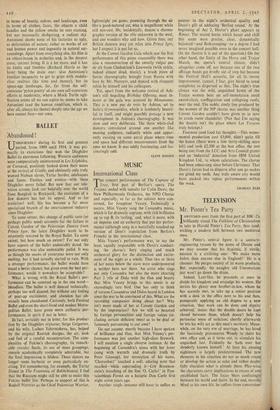Literary historians will speculate endlessly about Pound's and Eliot's sarcastic
hostility to Arthur Waley. It was not reciprocated by Waley, who still speaks of both with appreciation and affection. It was not shared by Wyndham Lewis, either. As one who has known all these charac- ters and talked and corresponded with them, I am puzzled. Some critics would, of course, ex- plain that they were, like Yeats and D. H. Lawrence, Fascist Beasts and violent anti- semites. But I know tliat they were all as critical of Fascism—a term as unemotive in the Twenties as Syndicalism—as of Jews, among whom they honoured Epstein as highly as Julien Benda. Dr. Davie is, I suspect, t6o young to appreciate niceties belonging to a time when most intel- lectuals were either Stalinists or Trotskyites. He simply considers Pound a poor seer, but a masterly interpreter, sculptural or lapidary, hacking away at superfluities.
Good. And a guide who offers so many fresh and rewarding re-readings of the old Pound opus is not to be lightly scouted. Gaudier, Gautier, Gourmont—all the big influences are run over with lively intelligence to illuminate the
translations, the pseudo-translations, the great Cantos. Yet further questions remain for the
literary historian. A recent correspondence in
The Times Literary Supplement suggests the occupational risks of academic critics who treat
as sacrosanct the received texts of canonised Masters. There, a Scottish poet of unquestioned genius was praised for a poem contrived, by the
addition of some punctuation and by the sub- traction of some superfluous lines, from the prose of a 'Welshman. I now ask whediet The Waste Land (surgically operated on by Pound in an experiment Eliot never chose to see re- peated) is any more or less the work of Pound than Cathay (a body of verse similarly `edited' from the MS of Fenollosa with the notes of two Japanese professors). Commending his book to the general reader, I commend these questions to Dr. Davie. HUGH GORDON PORTEUS
Cranks and Crotchets
Ernest Pontifex. By Samuel Butler. Edited by Daniel Howard. (Methuen, 25s.) The Way of All Flesh, originally the sub-title of Ernest Pontifex, was published posthumously in 1903, very mildly expurgated by R. A. Streat- feild. Butler began the book in 1873 and worked on it intermittently for eleven years. It is not easy now to recapture the shock it gave stuffy readers, or to understand what seems to be its violent overpraise by GBS. I first read it as a school- boy of fifteen in the year of the first production. of St. Joan (1924). I fell for St. Joan, but the rest of Shaw left me cold, except for The Quint- essence of lbsenism and The Perfect Wagnerite; and I only really enjoyed the first volume of Butler's novel. Shaw and Butler had won their battle by then. The great cant-killers seemed terribly dusty to me.






































 Previous page
Previous page